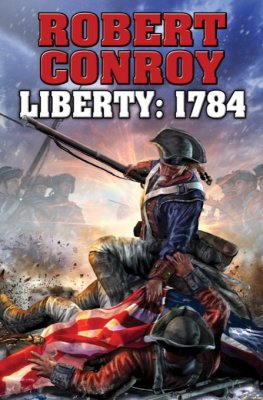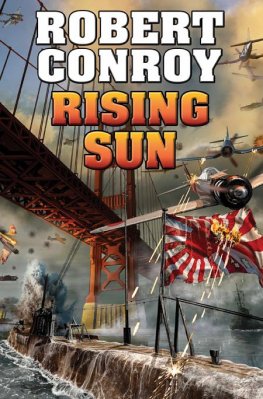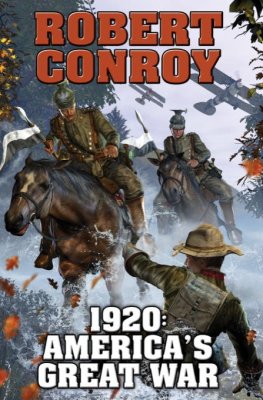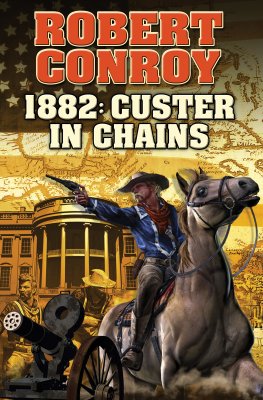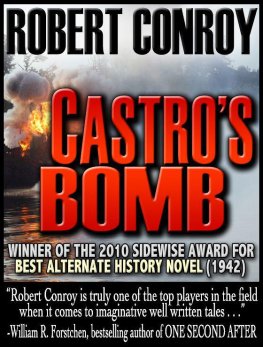Robert Conroy - Liberty: 1784
Here you can read online Robert Conroy - Liberty: 1784 full text of the book (entire story) in english for free. Download pdf and epub, get meaning, cover and reviews about this ebook. genre: Science fiction. Description of the work, (preface) as well as reviews are available. Best literature library LitArk.com created for fans of good reading and offers a wide selection of genres:
Romance novel
Science fiction
Adventure
Detective
Science
History
Home and family
Prose
Art
Politics
Computer
Non-fiction
Religion
Business
Children
Humor
Choose a favorite category and find really read worthwhile books. Enjoy immersion in the world of imagination, feel the emotions of the characters or learn something new for yourself, make an fascinating discovery.
- Book:Liberty: 1784
- Author:
- Genre:
- Rating:4 / 5
- Favourites:Add to favourites
- Your mark:
- 80
- 1
- 2
- 3
- 4
- 5
Liberty: 1784: summary, description and annotation
We offer to read an annotation, description, summary or preface (depends on what the author of the book "Liberty: 1784" wrote himself). If you haven't found the necessary information about the book — write in the comments, we will try to find it.
Liberty: 1784 — read online for free the complete book (whole text) full work
Below is the text of the book, divided by pages. System saving the place of the last page read, allows you to conveniently read the book "Liberty: 1784" online for free, without having to search again every time where you left off. Put a bookmark, and you can go to the page where you finished reading at any time.
Font size:
Interval:
Bookmark:
Robert Conroy
Liberty: 1784
Introduction
George Washington never suffered a truly catastrophic defeat during the revolution, although he certainly had numerous opportunities to fail in a manner that would have ended the war.
His inexperience as a field general nearly saw his army destroyed at Long Island, and it was only good fortune that saw a British relief fleet defeated off Yorktown since a second British fleet arrived shortly after Cornwallis surrender. And the other times he took the field to confront the main British Army, he was generally less than successful, as with Brandywine, and Germantown, while some consider the battle at Monmouth to have been a draw. To be fair, he did have his share of victories such as Trenton and Princeton, but they were relatively minor actions against smaller segments of the British army.
Washington had to keep his army intact in order to keep the revolution alive. A serious defeat could have devastated the revolution that began in 1775. But would it have meant an end to the revolutionary spirit, or simply a temporary lull in the fighting?
In Liberty, the first British relief fleet does arrive in a timely manner off Yorktown in the Fall of 1781, does defeat the French fleet (which should have happened if only the British had been smarter). Cornwallis then goes on to rout the Americans and Washington, who had gambled all in an attempt to trap and defeat Cornwallis; thus ending a war that had gone on for years.
However, I do not believe it would have meant the end of the revolutionary spirit. Instead, I believe that numbers of hardcore revolutionaries would have migrated westward, much in the manner that the South Africans did to flee the British only twenty years later. They would have done so to keep their freedoms and to save their skins from a vengeful British government.
Yet, how far could Americans run and how far would the British, fearing a resurgence of the revolution, chase them?
I believe that the British would have recognized the presence of a free nation as a great threat and would have chased them hard and far to bring the rebels to heel or to destroy them.
Thus, the story of Liberty.
Prologue
Major James Fitzroy wrapped his cloak about his short, spare, lean body in a vain attempt to keep out the cold spring rain that was soaking London and anyone foolish enough to be outside. At least he wasnt suffering alone, he thought as he sniffled and wiped his running nose on his already wet sleeve. If misery loved company, then he was in good company indeed.
To his right and slightly to his front was Lieutenant General John Burgoyne, his commander, distant cousin, and mentor. The weather didnt seem to bother the general. He loved the theater and considered himself an actor and an actor was always on stage. He wouldnt let a simple thing like a freezing deluge upset his composure, while Fitzroy tried and failed to emulate him.
Burgoyne chatted amiably with the brothers Howe-Admiral Richard Howe and General William Howe. General Howe had been excoriated by Parliament for not attacking the rebels more aggressively during the revolutions early months, and it was assumed that his presence at todays ceremony was a punishment for his failure to act decisively. The admiral was there to represent the Royal Navy. He hadnt actually been disgraced, although some said that Admiral Howe could have ended the war years earlier had he only been more aggressive in stopping Washingtons retreat from Long Island to Manhattan. It was accepted that the Howe brothers had sinned in the eyes of the king by being less than enthusiastic supporters of the war against the colonies.
Lord Frederick North, the prime minister, and his companions were smiling and gloating. To Fitzroy, it was unseemly. A man was about to die. Even a criminal or a traitor was entitled to die with a modicum of dignity. North had not been a strong supporter of the war, but he had supported his king and now the moment of triumph was at hand. After today, North had made it known that the chaotic and violent situation in France would become his primary focus.
Even Lord George Germain, the Viscount Sackville, had risen from his sickbed to see this day of harsh justice. It was widely understood that Germain wouldnt have too many more days on this earth. His replacement in control of North America, Lord Stormont, stood by impassively.
The Tower of London had always been one of Fitzroys favorite places, but not this day. It is both a medieval fortress and a complex group of buildings covering a fairly large area of ground. The actual Tower, a surprisingly elegant white stone keep, had originally been built by William the Conqueror to control the Saxons. It was alleged by historians that the overall site also held Roman fortifications. Numerous other buildings, walls, battlements had been added to the original Tower. The entire complex was both a symbol of strength and a strategic point on the Thames. All of these made it a marvelous prison for those guilty of crimes against the crown, although it was rarely used as such in these times.
When will this damned circus start? snarled Edmund Burke, a man who had spoken out against the War in the Americas. Was he being punished too? Fitzroy thought it likely.
I believe hes saying his prayers, North commented with a cold smile. And a damned good thing if you ask me. The bastards going to burn in hell.
Fitzroy shuddered. Men should die in bed surrounded by loved ones or in battle proving their courage. They should not be executed by their fellow men in a brutal and coldblooded ritual. At least this death would occur in relative privacy. There would be no screaming and drunken mobs numbering in the thousands as was normally the case for a major execution, and was beginning to occur with horrifying frequency in France, a nation that was falling apart. There was too much risk that the masses would riot if it was held at Tyburn Hill. Tyburn was normally used for the hanging of thieves, while this would be the decapitation of a traitor.
Only the few dozen gathered in the rain had been invited and would witness it. Nor would any member of the royal family dignify the proceedings by their presence, although Fitzroy suspected that some younger members of the House of Hanover had sneaked in to the grounds and were looking on from windows above. He hoped they learned something from watching this murderous ritual, although he doubted it. The Hanovers, now led by the often ill George III, were as stubborn a bunch of Germans as had ever been produced. At least the current George actually spoke English, a skill never quite mastered by his predecessors, in part because they never considered themselves English.
The door to the chapel opened and red-coated guards emerged. About time, muttered Burgoyne. Fitzroy stifled a smile. Perhaps the great actor truly was feeling the weather. Burgoyne was no longer a young man, which made it even more likely.
In the guards midst stood a very tall man with a shock of short white hair that showed hints that it might once have been red. He wore nothing more than a long nightshirt that hung below his knees and a pair of badly scuffed shoes. His legs were white and knobby. He looked like a lunatic from the insane asylum at Bedlam. His once powerful body was now but skin and bones. His flesh was pale and why not? He hadnt been outdoors in a number of months. For securitys sake, even his trial had taken place in the Tower. Nor had he been shaved in several days, which made him look even scruffier, even more the lunatic, although they all knew that was not the case. The prisoner blinked and looked around at those assembled. He started to smile and quickly closed his mouth. He had no teeth and looked ghastly as a result. Still, he managed to look like a predator, a caged tiger. Fitzroy stifled a shudder. This was the enemy.
Font size:
Interval:
Bookmark:
Similar books «Liberty: 1784»
Look at similar books to Liberty: 1784. We have selected literature similar in name and meaning in the hope of providing readers with more options to find new, interesting, not yet read works.
Discussion, reviews of the book Liberty: 1784 and just readers' own opinions. Leave your comments, write what you think about the work, its meaning or the main characters. Specify what exactly you liked and what you didn't like, and why you think so.

